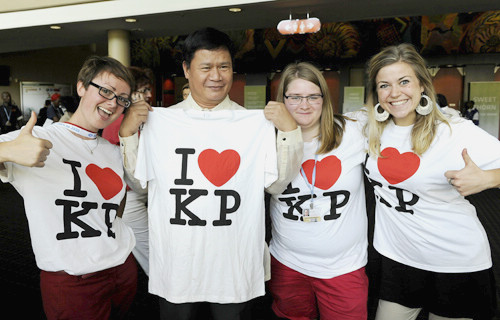|
 |
|
SINCERE SUPPORT: A delegate from the Philippines to the UN Climate Change Conference (second left) holds a T-shirt advocating the Kyoto Protocol, posing for a photo with representatives from a European NGO in Durban, South Africa, on December 2 (LI QIHUA) |
Passed in December 1997 and coming into effect in February 2005, the Kyoto Protocol is the only legally binding agreement that sets targets for the greenhouse gas emissions of major developed countries. Its first commitment period will expire at the end of 2012. The adoption of the second commitment period became a major topic of the recent UN climate change talks in Durban.
The 12-day conference was officially known as the 17th session of the Conference of Parties (COP) to the UN Framework Convention on Climate Change (UNFCCC) and the seventh session of the Meeting of the Parties to the Kyoto Protocol. Nearly 30,000 representatives from more than 190 countries attended the event.
"The process needs to take two decisive steps here in Durban: finishing the tasks from COP 16 and answering the key political questions that remained unanswered in Cancun," said Christiana Figueres, Executive Secretary of the UNFCCC, at the opening ceremony of the talks on November 28.
To be specific, the future of the Kyoto Protocol, as well as financing the response to climate change, topped the agenda of the Durban conference. Despite glaring differences, hopes remained alive for countries to make compromises on these key issues.
China has not changed its international negotiating position, but just strengthened communication with other countries on its policies, said Changhua Wu, the Greater China Director of the Climate Group, while explaining the world's heated responses to China's statement on a legally binding treaty after 2020. The Climate Group is a non-profit organization that works with businesses and governments to promote clean energy to reduce global greenhouse gas emissions.
On December 5, Xie Zhenhua, China's top climate negotiator and Vice Chairman of the National Development and Reform Commission, declared that China will agree to participate in a legally binding treaty on climate change after 2020 under certain conditions (see box).
"China is willing to shoulder responsibilities in line with its development and capability as long as the legal framework after 2020 will comply with the principles of 'common but differentiated' responsibilities," said Xie.
So far, no member countries have said they will not continue the Kyoto Protocol, while some said they won't have a second commitment period after the first expires, Xie said.
Xie's statement was regarded as a signal of transition in China's climate stance by many people. They believe China's openness toward a legally binding climate deal that would come into effect after 2020 has given a boost to the ongoing climate change talks in Durban.
But Wu expressed his objection to these opinions. There was not much new information in China's statement. It was just that some people didn't get China's stance till now, said Wu.
"Currently, the Kyoto Protocol is deadlocked. If we don't revitalize it, it will just get stuck," said Yang Fuqiang, chief representative of the Beijing office of the Energy Foundation, a San Francisco-based NGO that promotes energy efficiency.
At this moment, the BASIC countries (Brazil, South Africa, India and China) expressed willingness to talk with any country that supports the second commitment period. There may be some concessions. Unless concessions are made, the negotiations will not be able to move ahead, said Yang.
| 